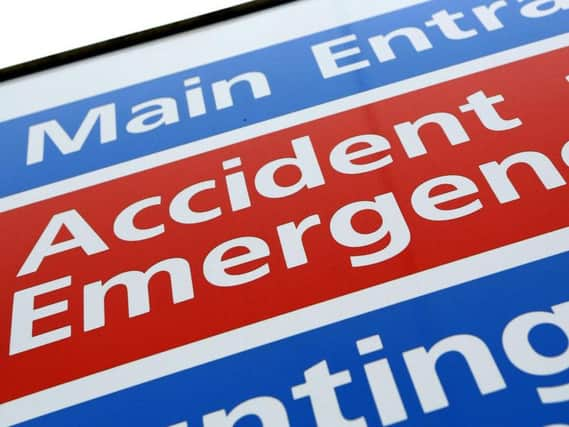Patients could be banned from attending A&E if they don't phone up first


The "talk before you walk" scheme would mean patients could not just turn to A&E for help without first seeking advice elsewhere.
Dr Helen Thomas, national medical adviser for integrated urgent care at NHS England, told a conference that it "may well pilot" a scheme to stop patients - with the Health Secretary's backing - in a bid to cut down the numbers attending A&E.
Advertisement
Hide AdAdvertisement
Hide AdThe British Medical Association (BMA) and College of Emergency Medicine said such a plan was misguided and the pressure on A&E departments was actually due to seriously ill people needing care.
Speaking at a conference recorded on tape by Pulse magazine, Dr Thomas said: "So, Jeremy Hunt has mentioned to some of my colleagues that maybe we should have a 'talk before you walk' and we may well pilot that.
"I think it's been done in other countries, where they have said to people, 'you can't come into ED (emergency department) until you have talked on the phone' or you have to have a docket that you're given having talked on the phone, that you do need to come to ED.
"I think that's politically quite a hot potato but there are places where they have said they are willing to pilot it.
Advertisement
Hide AdAdvertisement
Hide Ad"And I think if we could pilot it in just one area we would get some really interesting information."
She said that of 100 patients who go to A&E, only 20 have called 111 beforehand.
"So I think, with that other 80, there is an opportunity there. Some of them will need ED but there is an awful lot that won't.
"And in fact, my sister said she took my mother there the other day and there were people with a picnic. It's almost becoming a day out for people..."
Advertisement
Hide AdAdvertisement
Hide AdAn NHS England spokesman denied there were any plans to change the current system.
He said: "It is wrong to suggest or imply that the NHS will do anything other than continue to provide A&E care for all patients who need it, nor are there any plans to prevent patients from visiting A&Es alongside the other options now available for non-urgent care such as NHS 111 or urgent treatment centres."
A Department of Health spokeswoman said: "There are absolutely no plans to pilot this approach - patients can be reassured that unprecedented planning has gone in to preparing the NHS for this winter, supported by an extra £100 million for A&E departments and £2 billion for the social care system."
But shadow health secretary Jonathan Ashworth said: "A&E targets are already being missed month after month, so it's incredible that ministers are now considering putting new restrictions on services.
Advertisement
Hide AdAdvertisement
Hide Ad"The NHS is being pushed so far to the brink due to underfunding that ministers are in secret discussions to ban sick or injured people from walking into A&Es.
"Patients deserve better and will want to know how these new restrictions will be policed. Do ministers really expect sick patients to be turned away at the A&E door?"
Dr Chaand Nagpaul, chairman of the British Medical Association (BMA), said: "Trying to solve a problem in one part of the NHS by shifting it on to another won't work.
"Pressure on emergency departments is down to seriously ill patients and a lack of capacity and funding across the whole system.
Advertisement
Hide AdAdvertisement
Hide Ad"All this proposed system would do is add an extra layer of bureaucracy for patients and an extra burden on the NHS, GPs, or other clinicians.
"It could also have the added effect of increasing the burden on the ambulance service as people could instead just call an ambulance to get a place in A&E."
Figures from NHS Digital show that 37% of people going to A&E are discharged with no follow-up needed, while 20% are discharged to their GP and 20% are admitted to hospital.
But Chris Moulton, vice president of the Royal College of Emergency Medicine, said data showed that British people "do not attend A&E more often than in any other country in the developed world".
Advertisement
Hide AdAdvertisement
Hide AdHe added: "This is blaming the patient for problems in the system.
"Most of those needing hospital care have complex conditions, they are older people, those with cancer and those who need genuine care.
"These people that they are saying they want to divert are not the ones filling the beds."
He said the college's own estimates were that 15% to 20% of people in A&E could be treated by a GP and it was a fallacy to suggest most people in A&E were time-wasters.
Advertisement
Hide AdAdvertisement
Hide AdProfessor Helen Stokes-Lampard, chairman of the Royal College of GPs, said: "Our understanding of this proposed pilot scheme is that it will involve phone referrals to A&E via NHS 111 - it will not involve patients having to make additional visits to their GP before they can attend A&E.
"However, if what is being reported is the case, then this would be completely counter-productive.
"We know that the main issue contributing to pressures in A&E is not inappropriate attendance, but a lack of hospital beds, and a lack of the community support services patients need when they are discharged, so they end up staying in hospital for longer than they needed to."
Rachel Power, chief executive of the Patients Association, said: "Will the parent of a child who has fallen and broken their arm, for instance, really have to call 111 or get a GP referral first?
"Are they even likely to know such a bar exists? Will there be bouncers on the door, turning people away?"